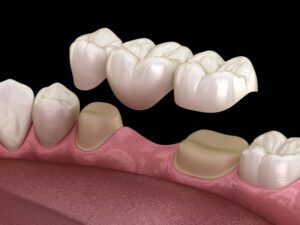
If you’re missing one or more teeth, you’ve likely come across two popular replacement options — partial dentures and dental bridges. Both can restore your smile, improve chewing, and prevent your remaining teeth from shifting out of place. But while they share a common goal, they differ in design, cost, and long-term benefits.
So how do you know which one is right for you? Here’s a clear breakdown to help you make the best choice for your smile and oral health.
What is a Partial Denture?
A partial denture is a removable dental appliance designed to replace multiple missing teeth, often in different areas of your mouth. It consists of artificial teeth attached to a gum-colored acrylic or metal base that fits snugly along your gums. Clasps or attachments connect the denture to your remaining natural teeth for support.
Partial dentures are ideal for patients who:
- Are missing several teeth in one or both arches.
- Want a cost-effective tooth replacement solution.
- Need a non-surgical option.
- May eventually need additional teeth replaced.
Partial dentures can be easily adjusted or expanded if more teeth are lost in the future, making them a flexible and affordable choice for many patients.
What is a Dental Bridge?
A dental bridge is a fixed (non-removable) restoration that replaces one or a few missing teeth in a row. It’s anchored by crowns placed on the healthy teeth adjacent to the gap, with a pontic (artificial tooth) suspended between them to fill the space.
Dental bridges are a great solution for patients who:
- Are missing one or a few consecutive teeth.
- Have strong, healthy neighboring teeth for support.
- Prefer a permanent restoration that doesn’t need daily removal.
Bridges are usually made from porcelain, ceramic, or metal alloys — materials chosen to match your natural teeth for a seamless appearance.
Key Differences Between Partial Dentures and Bridges
Permanence
Partial dentures are removable, while bridges are fixed and cemented in place. If you prefer a more natural feel and don’t want to remove your restoration daily, a bridge may be more convenient.
Durability
Bridges tend to be more stable and long-lasting than partial dentures, especially when properly cared for. However, partial dentures can be repaired or adjusted easily, while bridges may need replacement if supporting teeth are damaged.
Comfort and Fit
Because bridges are custom-fitted and bonded permanently, they often feel more like your natural teeth. Partial dentures may require an adjustment period, especially as your mouth adapts to the appliance.
Cost
Partial dentures are generally less expensive upfront than dental bridges, but bridges can be a better long-term investment due to their stability and longevity.
Which Option is Right for You?
The best choice depends on your oral health, number of missing teeth, and personal preferences. If you’re missing several teeth across your mouth and prefer a removable, budget-friendly option, a partial denture may suit you best. If you’re missing only one or a few teeth in a row and want a permanent, natural-feeling replacement, a dental bridge may be the ideal choice.
Your dentist will evaluate your remaining teeth, gum health, and bone structure to recommend the most effective treatment for your needs.
Both partial dentures and dental bridges can beautifully restore your smile and function — it just depends on your unique situation. Schedule a consultation with your dentist to discuss your goals, review your options, and find the solution that gives you back your confidence and comfort.
About the Author
Dr. Praveena Muddana earned her dental degree from the NYU College of Dentistry. Today, she stays current in the dental field and the latest developments through memberships in the American Dental Association, the Wisconsin Dental Association, and the American Academy of Cosmetic Dentistry. Are you in the market for a dental bridge? If so, we can help! Schedule an appointment online or call our Milwaukee office at (414) 808-2003.
